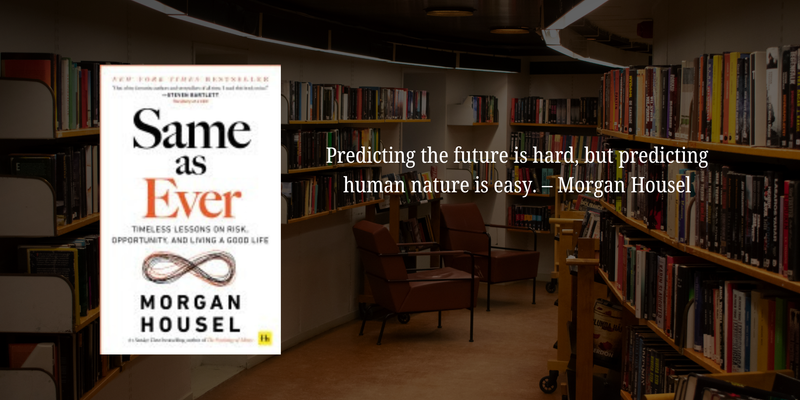Highlights
- 1 Same as Ever: A Guide to What Never Changes by Morgan Housel
- 1.1 7 Key Takeaways from the Book Same as Ever
- 1.1.1 1. Uncertainty is the Only Certainty
- 1.1.2 2. Greed and Fear Drive Human Behaviour
- 1.1.3 3. Patience Beats Intelligence in the Long Run
- 1.1.4 4. Wealth is a Mindset, Not a Number
- 1.1.5 5. Survival is the Ultimate Measure of Success
- 1.1.6 6. Ego is the Enemy of Progress
- 1.1.7 7. History Repeats—Because Human Nature Doesn’t Change
- 1.1 7 Key Takeaways from the Book Same as Ever
Same as Ever: A Guide to What Never Changes by Morgan Housel
In an ever-evolving world, the assumption often made is that success, decision-making, and human behaviour are governed by new rules that emerge over time. However, renowned author Morgan Housel challenges this notion in his book Same as Ever: A Guide to What Never Changes. He emphasises that while technology, economies, and industries may change, the fundamental aspects of human psychology, risk, and decision-making remain consistent.
Housel, also acclaimed for The Psychology of Money, leverages his knowledge in behavioural finance and long-term thinking. In Same as Ever, he explores enduring patterns that have influenced human behaviour for generations—and will continue to do so. These insights extend beyond finance and are relevant to aspects of life, business, relationships, and personal development.
This book presents invaluable lessons for anyone wishing to enhance decision-making skills, adapt to uncertainty, and identify the true drivers of success.
7 Key Takeaways from the Book Same as Ever
1. Uncertainty is the Only Certainty
A significant lesson from the book is that uncertainty should not be shunned but rather embraced. Throughout history, people have attempted to forecast the future—be it in markets, politics, or technological innovations—but accuracy is rare. Housel notes that real success lies not in predicting what lies ahead but in preparing for the unpredictable. This involves diversifying risks, remaining adaptable, and focusing on resilience as opposed to certainty.
2. Greed and Fear Drive Human Behaviour
Even with advancements in technology and knowledge, emotions related to financial gains and losses have not evolved. Fear can prompt panic selling in markets, while greed can create bubbles that eventually burst. Housel posits that recognising these emotions in oneself can aid in making more informed decisions. Mastering emotional regulation is an age-old advantage, whether in investing, business decisions, or personal interactions.
3. Patience Beats Intelligence in the Long Run
Many individuals believe that intelligence or skill is the key to success, yet Housel asserts that patience and consistency often play more vital roles. This principle applies to investing, career development, and personal growth. He references historical figures who achieved wealth and success by taking a long-term approach rather than chasing fleeting trends. Those who remain steadfast, weather downturns, and make gradual progress typically surpass those who pursue shortcuts.
4. Wealth is a Mindset, Not a Number
Housel challenges the conventional belief that wealth equates solely to income or net worth. In his view, genuine wealth is reflected in one’s ability to manage time and make choices without the stress of financial pressure. It is a common misperception that higher income equals fewer problems; without sound financial habits, even those with high earnings can find themselves in precarious situations. Prioritising financial stewardship and freedom over luxury is essential.
5. Survival is the Ultimate Measure of Success
History showcases numerous examples of individuals, companies, and civilisations that faltered by disregarding the fundamental reality: survival is the most critical measure of success. Housel articulates that those who can endure and adapt—whether personally, in business, or investment—are the ones who genuinely thrive. Focusing on long-term strategies and effective risk management outweighs the importance of short-term victories.
6. Ego is the Enemy of Progress
People often overvalue their capabilities, particularly after experiencing initial success. This overconfidence can lead to detrimental decision-making, whether in business, leadership, or investing. Housel cautions that ego obscures one’s view of risks and fosters resistance to learning from missteps. Exceptional decision-makers remain humble, actively seek constructive feedback, acknowledge uncertainty, and adapt strategies while prioritising growth over the need to be right.
7. History Repeats—Because Human Nature Doesn’t Change
Perhaps the most pivotal lesson from Same as Ever is that history tends to repeat itself—not due to identical events but because the nature of humanity remains constant. Greed, fear, impatience, and overconfidence have influenced societies throughout time, and this will persist. By studying historical patterns, one can better anticipate and prepare for the future, avoiding the pitfalls of being unprepared. Learning from history stands as one of the most potent methods for making informed choices today.
